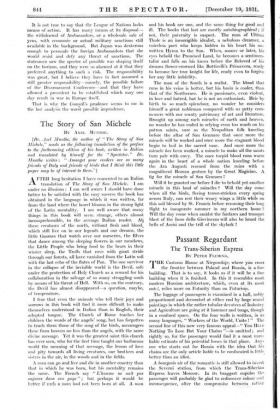The Story of San Michele
BY AXEL MUNTHE.
[Dr. Axel Munthe, the author of "The Story of San Michele," sends us the following translation of the preface to the fortheonzing edition of his book, written in Italian and translated by himself for the "Spectator." Dr. Munthe writes : "Amongst your readers are so many friends of Italy and friends of birds that I think this little paper may be of interest to them."] AFTER long hesitation I have consented to an Italian translation of The Story of San Michele. I am under no illusions : I am well aware I should have done better to be satisfied with the easy success the book has obtained in the language in which it was written, far from the land where the laurel blooms in the strong light of the Latin mentality. I am well aware that many things in this book will seem strange, others almost incomprehensible, to the average Italian reader. Ali these creatures of the -north, without flesh and blood, which still live on in our legends and our dreams, the little Gnomes that watch over our nurseries, the Elves that dance among the sleeping flowers in our meadows, the Little People who bring food to the bears in their winter sleep, the Trolls that rove with giant stride through our forests, all have vanished from the Latin soil with the last echo of the flutes of Pan. The one survivor in the collapse of the invisible world is the Devil, safe under the protection of Holy Church as a reward for his collaboration in the salvage of so many struggling souls by means of his threat of Hell. With us, on the contrary, the Devil has almost disappeared—a question, maybe, of temperature.
I fear that even the animals who tell their joys and sorrows in this book will find it more difficult to make themselves understood in Italian than in English, their adopted tongue. The Church of Rome teaches her children the words of the angels' song, but has forgotten to teach them those of the song of the birds, messengers these from heaven no less than the angels, with the same divine message. Yet it was the greatest saint this church has ever seen, who for the first time taught our barbarous world the meaning of that message, the lesson of love and pity towards all living creatures, our brothers and sisters in the air, in the woods and in the fields.
A man can go and live and die in another country than that in which he was born, but his mentality remains the same. The French say " L'homnze ne nait pas oujours dans son pays " ; but perhaps it would be better if such a man had not been born at all. A man and his book are one, and the same thing for good and ill. The books that last are mostly autobiographical ; if not, their paternity is suspect. The man of Ultima Thule- is an incorrigible idealist, a nebulous dreamer, a voiceless poet who keeps hidden in his heart his un- written Hymn to the Sun. When, sooner or later, his eyes behold the Promised Land, he becomes a sentimen- talist and falls on his knees before the Beloved of his dreams flower-crowned like Botticelli's Primavera, ready to become her true knight for life, ready even to forgive her any little infidelity.
The man of the South is a realist. The blood that runs in his veins is hotter, but his brain is cooler,r than that of the Northerner. He is passionate, even violent, in love and hatred, but he is not an enthusiast Heir by birth to so much splendour, no wonder he considers himself a great nobleman compared with us petty com- moners with our scanty patrimony of art and literature. Brought up among such miracles of earth and heaven, no wonder he has ended in relying even too much on his patron saints, sure as the Neapolitan folk kneeling before the altar of San Gennaro that once more the miracle will be worked and once more the stagnant blood begin to boil in the sacred vase. And once more the miracle has been worked, a miracle to make all the saints turn pale with envy. The once torpid blood runs warm again in the heart of a whole nation kneeling before the Ara Augusti rescued from the ruins . with a magnificent Roman gesture by the Great Magician. A fig for the miracle of San Gennaro !
Will it be granted me before I die to behold yet another miracle in this land of miracles ? Will the day come when all the birds, fleeing terror-stricken every spring across Italy, can rest their weary wings a little while on this soil blessed by St. Francis before resuming their long flight to inaugurate summer in my northern home ? Will the day come when amidst the fanfares and trumpet blast of the Inno della Giovinezza will also be heard the bells of Assisi and the trill of the skylark ?


































 Previous page
Previous page